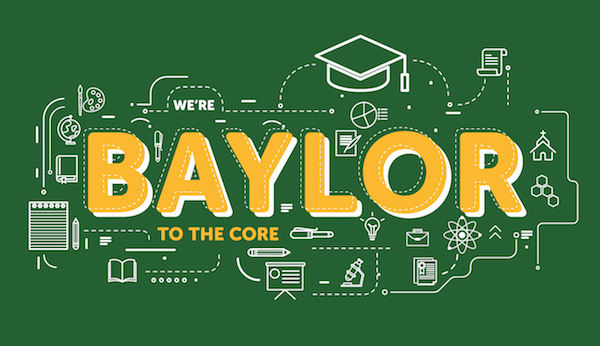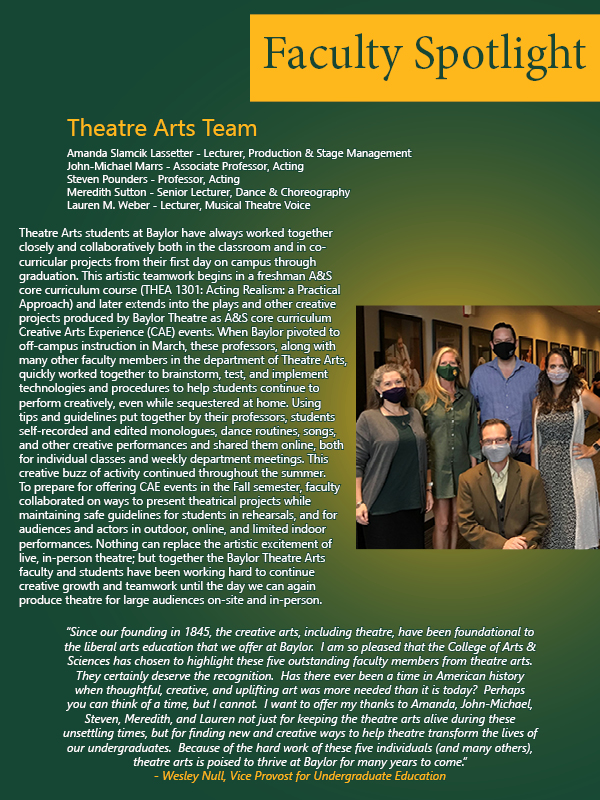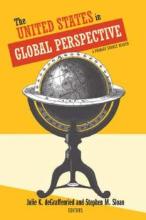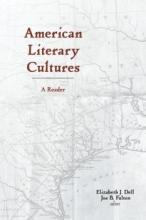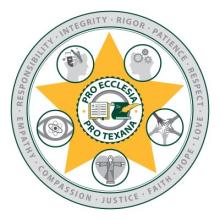2020-2021, Issue 1 Fall
Core Faculty Newsletter
2020-2021, Issue 1 - Fall
Dear Colleagues,
The Fall 2020 semester is well underway thanks to the culmination of hours upon hours of planning and preparation by Baylor faculty, staff, and administration. In light of our efforts to offer the best general education in America, the Office of the Core in the College of Arts & Sciences would like to highlight resources, opportunities, and news from across Baylor's campus that speak to the vision of the A&S core curriculum as well as promote faculty development and general education more broadly.
A focus of this edition is in finding ways to navigate teaching general education courses in times of COVID-19 and social unrest. Dr. Christopher Richmann shares with you his thoughts on "Compassionate Teaching;" Dr. Lori Kanitz writes about "A Call to Formative Friendships" and the importance of community in virtue formation; and as we all work toward diverse and inclusive classroom environments for our students, a list of multicultural events and resources for faculty are highlighted in our sections on 'Diversity and the Core' and 'Opportunities for Engagement.'
But first, join me in recognizing our colleagues Amanda Slamcik Lassetter, John-Michael Marrs, Steven Pounders, Meredith Sutton, and Lauren M. Weber, who worked together over the past year to transition their Theatre Arts courses to online learning, and collaborated to find new ways to present theatrical projects to the Baylor Community during these challenging times. This Theatre Arts Team has the honor of serving as our Fall 2020 "Faculty Spotlight." Each Core Faculty Newsletter begins with a Faculty Spotlight in which we celebrate the talent of those among us and their commitment to teaching in the core curriculum.
For more information on the Arts & Sciences core curriculum, including a complete list of courses, definitions for all core virtues, as well as a Baylor password protected faculty teaching resources page, visit www.baylor.edu/ascore.
Sincerely,
Lauren Poor, Ph.D.
Director of the Core, College of Arts & Sciences
The Teaching Corner: Pedagogy and the Core
Compassionate Teaching
- Dr. Christopher Richmann, ATL Assistant Director
In a pandemic world, we and our students are hard-pressed by many new tasks, tools, and rituals. These pressures are compounded by our worries about the future. The times call for compassion in all our relationships and vocations. As educators, we can prove our Christian profession by teaching compassionately.
This is not a call for sacrificing academic rigor. Rather, this is first a matter of coming to grips with what is necessary in our courses. If we ask students for unnecessary performance, we are only adding to the burden of an already heavy semester.
The reasonable way to determine what is “necessary” is by holding your learning assessments and activities to the light of relevant, measurable learning objectives. If ever there were a time to avoid even the whiff of “busy work,” this is it. If a third paper or fourth reading is not necessary to meet your learning objectives, consider dropping it. In this way, you are showing compassion to your students and yourself (or whoever does the grading). You might discover teaching methods that are not only compassionate but also better for learning. For example, trading in a few high-stakes exams for many low-stakes assessments reduces student anxiety, is better for student retention of material, and gives instructors more useful information about student understanding (aka formative assessment).
The mechanics of your assignments and assessments are also opportunities for compassion. If citations in a specific disciplinary style are not necessary, allow students to cite sources in whatever style they prefer. Rather than enforcing a detailed late grading policy, give students “oops tokens,” which allow them to turn in one or two assignments late, no questions asked, no excuses given, no points deducted. Such compassionate policies are good for you and students.
We can also teach compassionately through our interactions with students. As figures of influence and authority, instructors can offer crucial personal support–even if only to listen and refer students to other resources. More related to learning, interactions between instructors and students contribute to students’ emotional experience of a course, which is linked to attention, memory, cognition, and motivation. Frequent communication with students through meetings, regular announcements, Q&A discussion boards, and personal emails can help students feel connected, especially in hybrid and online courses lacking in-person interactions. Instructors can also foster positive feelings through humor, self-disclosure, and other behaviors James Lange collectively refers to as a “pedagogy of presence.”
The longer we must stand six feet apart from each other, the deeper we ought to sense our shared humanity. As a teacher, you engage in a task that gives opportunities and responsibilities for compassion, one human to other humans. But compassionate teaching, it turns out, is also effective teaching.
Diversity and the Core
Diversity & Inclusion in the Classroom
- Dr. Kimberly Kellison, Associate Dean for Humanities and Social Sciences
- Dr. Elizabeth D. Palacios, Dean for Student Development
Faculty members who are teaching in the Core Curriculum continue to emphasize diversity and inclusion in their teaching. In February 2020, four Arts & Sciences faculty members presented a Seminar for Excellence in Teaching (SET) titled “How I Changed my Course for Diversity and Inclusion.” Sponsored by the Academy for Teaching and Learning, the seminar featured Elise Edwards (Religion), Tara Foley (English), Kristi Humphreys (English) and David Moseman (Religion). The participants, all of whom teach courses in the Common Core and all of whom participated in last year’s Intergroup Dialogue three-day workshop, shared with a large and attentive audience different approaches they have adopted to foster greater diversity and inclusion in the classroom. Additional ATL seminars dedicated to diversity and inclusion are planned for the future.
As we work toward inclusive classroom environments for our students, there are numerous occasions for you, your colleagues, and your students to participate in diversity opportunities at Baylor and in the wider academic community, including:
- September 3, 6 pm - My Sister, My Self will have their kickoff meeting virtually. Contact Courtney Streat.
- September 11, 2:30 pm - ATL's SET on Teaching Culturally Sensitive Topics.
- Baylor Latinas Unidas will have a kick-off meeting in September TBD, contact Michelle Gonzalez.
- Better Together BU is an on-campus interfaith group, contact Sharyl Loeung.
- MA Book Club will occur virtually, contact Madelynn Lee.
- M.I.S.T.E.R. (Males Inspiring Success Through Education & Relationship) will be meeting every 3rd Thursday of the month at 6 pm. This will be held virtually in the fall, contact Dominique Hill.
- Neighbor Nights Dinners hosted by Multicultural groups on campus, contact Sharyl Loeung.
If you have any speakers or events that you would like to publicize that relate to multicultural experiences, please send us your information to share with our campus community. For faculty resources you may also visit the Core Diversity & Inclusion webpage.
Virtues and the Core
A Call to Formative Friendships
- Dr. Lori Kanitz, IFL Assistant Director
The College of Arts and Sciences’ core curriculum vision statement begins with these words:
“Functionally, the Arts and Sciences core curriculum, taught within a community of Christian scholars [emphasis added], enables men and women to acquire the knowledge, skills, and virtues needed to uncover and recognize truth, to deepen their faith, to live virtuously, to strengthen their communities, and to affect the world in transformative ways.”
A perhaps easily overlooked, but essential, word here is “community.” Virtue formation is and always has been understood as a communal enterprise. Even more specifically, growing in virtue requires good—in both senses of the word—friends.
Aristotle’s Nicomachean Ethics devotes two of ten books (8 and 9) to the relationship of friendship to virtue, and virtue to human flourishing (eudaemonia). Book 8 begins with the observation that “[friendship] is some sort of excellence or virtue, or involves virtue, and it is, moreover, most indispensable for life. No one would choose to live without friends, even if he had all other goods. . . . [F]riends enhance our ability to think and to act” (1115a.5-8, 16). Moreover, Aristotle rightly discerns that justice in a community is predicated upon virtuous friendships in which men and women seek “concord” rather than “faction” (1155a.23-26). Roman statesman Cicero, while a de facto political exile near the end of the Roman Republic and his own life wrote the little essay On Friendship: “Nature gave us friendship as an aid to virtue, not as an assistant to vice. It was her hope that since virtue when solitary cannot arrive at the highest kind of life, it might do so when joined and shared with a companion” (On Friendship, xxii.83).
In this season when the COVID19 pandemic has seemingly flattened once inherently multi-dimensional relationships—among students, colleagues, friends, family members—to the single dimension of a computer screen, and deep divisions threaten genuine community, the challenge is to reimagine ways to welcome others into a learning experience that has virtue-formation as its telos. In other words, to reimagine what it means to be friends. As we consider ways to help students practice the virtues central to the core curriculum, could we ask anew what might it look like to invite Baylor students into a “community of Christian scholars”—online or in person? How might we cultivate friendships old and new to sustain us? What are ways we might encourage students to pursue friendships that nourish their best and highest aims? Doing so could help us discover fresh and beautiful ways, even in a pandemic, to seek the “highest kind of life” together as friends.
Upcoming IFL Events and Resources
- IFL’s first “Forming Character in the Classroom” workshop will happen virtually Thursday, Sept. 24, from 3:00 p.m. to 4:30 p.m. Dr. Perry L. Glanzer, professor of educational foundations and a resident scholar with the Baylor Institute for Studies of Religion will be presenting “Baylor Spirituality and Character Study, Preliminary Findings, 2018-2020.”
- New! “Faith Animating Online Education” resources are now available on IFL’s web site at https://www.baylor.edu/ifl/index.php?id=970399.
Creative Arts Experience
Getting to Know the CAE
- Jennings Sheffield, CAE Committee Chair
- Kaity Briscoe, CAE Director
The Creative Arts Experience (CAE) engages students in all the arts offered at Baylor University. Through participation in CAE events, students will encounter a wide variety of fine arts events sponsored by Baylor; grow and mature in the reception, interpretation, and appreciation of the arts throughout multiple semesters at Baylor; and develop cultural literacy, critical thinking, social skills, human empathy, and patronage of the arts. The goal of the Creative Arts Experience is to involve students actively in the fine arts community on campus, preparing them for a deep and meaningful engagement with the fine arts throughout life.
During students' time here at Baylor, students are required to attend twelve approved Creative Arts Experience with at least two events from each of the following categories: Art, Film, Music, Theatre, and Literature/World Cultures. Students entering Baylor with 30 hours receive two event credits. Students entering Baylor with 60 hours receive six event credits. We encourage students to attend as many fine arts experiences as they desire in addition to fulfilling the academic core requirement.
CAE faculty sponsors are already planning a number of exciting events for the Fall of 2020. These events will be following all of the guidelines of the university's COVID-19 mitigation efforts, with both online offerings and live events with limited seating and appropriate safe-distancing measures. Faculty members who would like to propose additional CAE events may do so here.
Chapel and the Core
Chapel for All
- Dr. Burt Burleson, University Chaplain
- Dr. Ryan Richardson, Director of Worship and Chapel
For nearly 100 years, the entire Baylor University family participated in Baylor Chapel. 75 years later, we welcome the family back. Today, all of the #BaylorFamily is invited to join the Chapel for All experience premiering on Facebook Watch each Monday and Wednesday at 7 am.
Change with chapel. Strengthen your Christian commitment. Deepen your faith.
Subscribe, share, and join us weekly for premieres, or on-demand viewing from wherever you are.
Common Readers
Common Course, Common Reader
- David Aycock, Baylor University Press
- Jenny Hunt, Baylor University Press
Baylor University Press and Baylor faculty have again partnered to produce two new and exciting volumes that will be widely used by Baylor’s undergraduates: The United States in Global Perspective: A Primary Source Reader was edited by Associate Professors Julie K. deGraffenried and Stephen M. Sloan of the Department of History, and American Literary Cultures: A Reader was edited by Senior Lecturer Elizabeth J. Dell and Professor Joe B. Fulton of the Department of English. The Departments of History and English, the Office of the Core, the Academy of Teaching and Learning, and the Dean’s Office in the College of Arts & Sciences supported both volumes by providing logistical aid and funding toward graduate student assistance and production expenses.
The United States in Global Perspective represents more than a year of research and editorial development to provide a vibrant collection of primary sources that gives instructors a tool that “globalizes” instruction. Through a variety of textual and visual sources, students can investigate the long history of the region’s engagement with the world as well as the ways in which the world has shaped the United States. Each chapter includes a section that presents a quick global overview of a specific topic or issue, using sources from varying locations and time periods. Instructors can utilize various pathways to follow specific themes throughout the book, such as labor, immigration, environmental history, African American history, urban history, and women’s rights.
The volume includes a beautiful 64-page insert of full-color graphics and images that enhance reader engagement. It also represents the fruit of a very deliberate effort to make the book affordable for Baylor students. “This nearly 700-page textbook with a lengthy full-color insert would normally sell for between sixty and seventy dollars,” notes Interim Director of Baylor University Press David Aycock. “But thanks to assistance from the Department of History and the College of Arts & Sciences, we were able to price the volume under forty dollars.” Aggregately, Baylor students will realize tens of thousands of dollars in savings over the textbook’s life at Baylor thanks to the lower price. The volume will be used in most, if not all, sections of HIS 1300 The U.S. in Global Perspective this fall.
American Literary Cultures highlights literature written by regional authors—particularly those of Texas and the Southwest—and includes readings representative of a broad array of American social, religious, racial, and ethnic groups from first contact to early twentieth-century Modernism. The volume will be used in sections of ENG 2310 American Literary Cultures: Imagining the American Experience, which focuses on the diverse literary cultures of the United States, from the early nineteenth century to the present.
“This really represents the first anthology of its kind,” notes Dr. Dell. “To our knowledge, no other anthology has ever focused on the literature of Texas and the American Southwest. We were highly selective in our editorial choices for the volume, and we believe Baylor students will greatly benefit from this rich and representative body of important texts.” At a generous 661 pages, the volume provides a tremendous resource to students for less than thirty dollars.
More than a thousand Baylor undergraduates will benefit from these two volumes during the 2020–2021 academic year, and perhaps more importantly, the volumes are expected to be adopted by other institutions of higher education in coming years. Baylor University Press is also taking steps to ensure both books are available in Amazon Kindle format for any students whose access to the print versions may be disrupted by the Covid-19 situation.
Publishing course textbooks with Baylor University Press offers faculty and departments the opportunity to tailor their volumes to Baylor’s mission and pedagogy, and students generally realize savings from lower-priced textbooks that would not be possible if the texts were produced by external publishing houses. The Press welcomes ideas for textbook partnerships with other Baylor University departments and schools.
Opportunities for Engagement
- September 3, 6 pm - My Sister, My Self will have their kickoff meeting virtually. Contact Courtney Streat.
- September 11, 2:30 pm - ATL's SET on Teaching Culturally Sensitive Topics.
- September 23, 3 pm – ATL’s SET on How COVID-19 Is Making Me a Better Teacher.
- September 24, 1 pm – IFL’s workshop on Forming Character in the Classroom.
- October 1-2 – Baylor McNair Research Conference. Sign up to volunteer to help out!
- October 8, 1 pm – ATL's SET on Rethinking Academic Integrity Online.
- October 14, 3:30 pm - ATL's SET on Minimizing Zoom Fatigue.
- Baylor Latinas Unidas will have a kick-off meeting in September TBD, contact Michelle Gonzalez.
- Better Together BU is an on-campus interfaith group, contact Sharyl Loeung.
- MA Book Club will occur virtually, contact Madelynn Lee.
- M.I.S.T.E.R. (Males Inspiring Success Through Education & Relationship) will be meeting every 3rd Thursday of the month at 6 pm. This will be held virtually in the fall, contact Dominique Hill.
- Neighbor Nights Dinners hosted by Multicultural groups on campus, contact Sharyl Loeung.
- New "Faith Animating Online Education" resources are now available on IFL's website.
- Developing a textbook or reader. If interested, please contact Baylor University Press Interim Director David Aycock.
- Proposals for Creative Arts Experiences (CAEs) 2020-2021 academic year are reviewed and accepted on a rolling basis. More Information.
To view more opportunities for engagement and further details, please visit the Opportunities for Engagement webpage.
